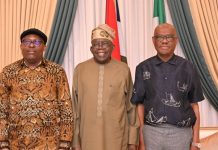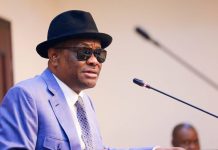Standard bearers of the Peoples Democratic Party in the 2023 election, Atiku Abubakar and his Labour Party counterpart, Peter Obi, have lampooned the Presidency for rejecting the European Union final report on the February 25 presidential election.
The EU Observer Mission in its report faulted the polls owing to “enduring systemic weaknesses.”
The election outcome has been disputed by the PDP and the LP and their candidates who alleged that the polls were not credible.
- UTME: JAMB withdraws result of ‘best’ student over forgery
- Price of petrol to hit N700 per litre in July — Marketers
But the Presidency in a statement on Sunday refuted claims by the EU that the election which produced President Bola Tinubu was flawed, describing the report by the EU observers as a “poorly done desk job.’’
The Chief Observer of the EU Election Election Observation Mission, Barry Andrews, had in a press briefing last week noted that “the election exposed enduring systemic weaknesses and therefore signal a need for further legal and operational reforms to enhance transparency, inclusiveness, and accountability.”
He said the shortcomings in the law and electoral administration hindered the conduct of well-run and inclusive elections and damaged trust in the Independent National Electoral Commission.
The EU EOM offered 23 recommendations for consideration by the Nigerian government that would improve future elections.
Of the 23, Andrews revealed that “We are particularly concerned about the need for reform in six areas which we have identified as priority recommendations, and we believe, if implemented, could contribute to improvements for the conduct of elections.”
The six priority recommendations highlighted the need to remove ambiguities in the law; establish a publicly accountable selection process for INEC members; ensure real-time publication of and access to election results; provide greater protection for media practitioners; address discrimination against women in political life, and impunity regarding electoral offences.
However, in the statement titled ‘We reject European Union’s conclusions on 2023 general elections,’ the President’s Special Adviser on Special Duties, Communication and Strategy, Dele Alake, alleged bias and an intention to “impeach the integrity of the 2023 elections” which it described as the “best organised general elections in Nigeria since 1999.
“We strongly reject, in its entirety, any notion and idea from any organisation, group, and individual remotely suggesting that the 2023 election was fraudulent,” the statement read.
The Presidency faulted the data-gathering technique employed in the report saying “While addressing journalists in Abuja on the so-called final report, Andrews noted that EU-EOM monitored the pre-election and post-election processes in Nigeria from January 11 to April 11, 2023 as an INEC accredited election monitoring group.
“Within this period, EU-EOM observed the elections through 11 Abuja-based analysts, and 40 election observers spread across 36 states and the Federal Capital Territory.”
The Presidency insisted that the 2023 general elections, “most especially the presidential election, won by President Bola Tinubu/All Progressives Congress, were credible, peaceful, free, fair and the best organised general elections in Nigeria since 1999.”
It added that “There is no substantial evidence provided by the European Union or any foreign and local organisation that is viable enough to impeach the integrity of the 2023 election outcomes.”
Describing the findings as “unfounded,” the Presidency said, “We can now categorically let Nigerians and the entire world know that we were not unaware of the machinations of the EU.”




